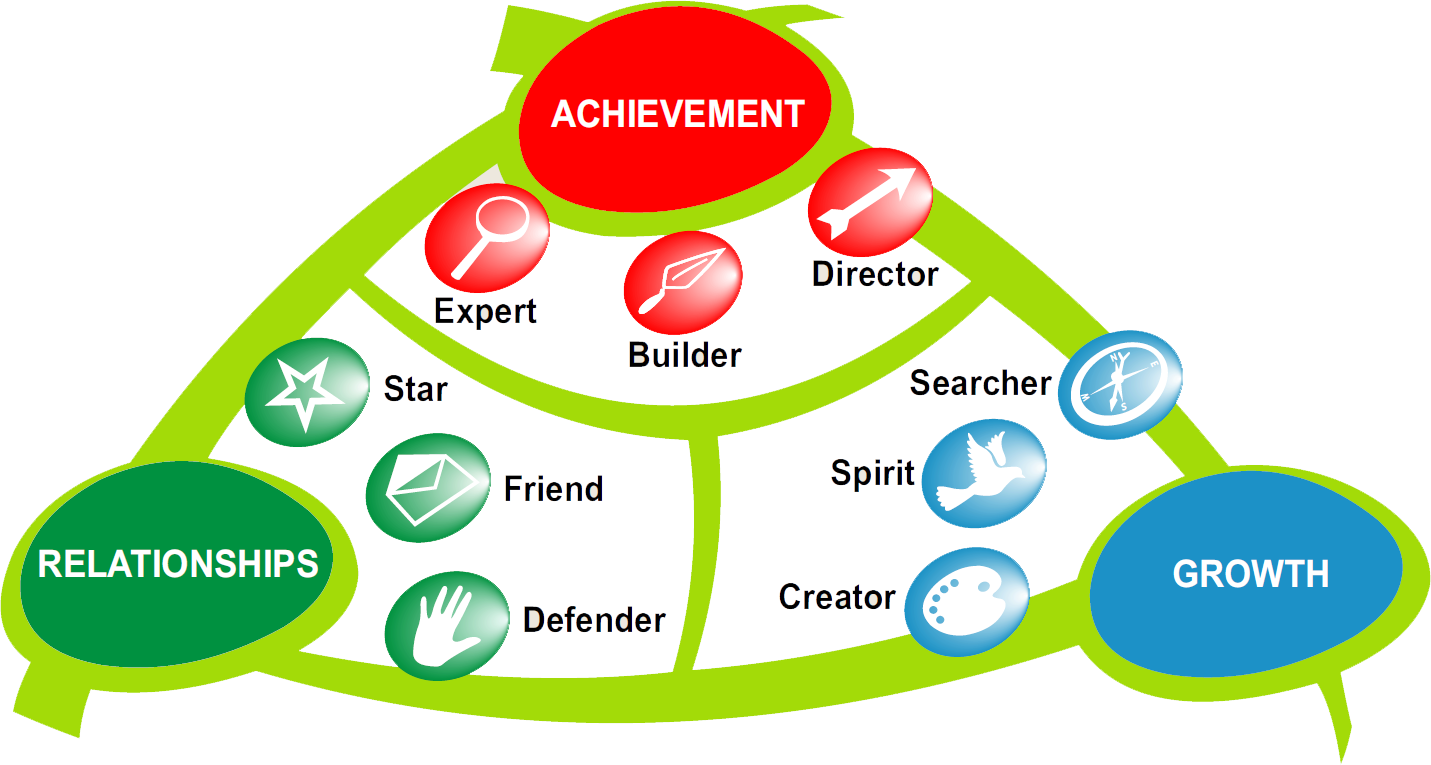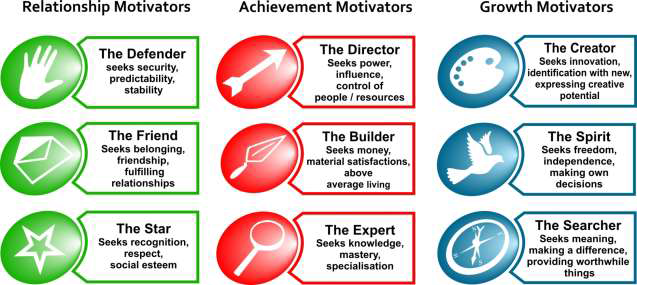The nine work motivators – what makes your team tick?

Leaders may know instinctively that to be engaged you need to be motivated, which drives performance. And they’d be correct. Hay group research proved that highly engaged employees are 50% more likely to exceed their performance targets. Motivation is energy, derived from the Anglo- Norman term, ‘motif’, which means ‘drive.’ Our motivations are our inner drivers, the fire in our belly, which determines how we feel and subsequently how we act. Motivation is often the secret ingredient that differentiates an ‘average’ performer, from an exceptional one; a ‘good’ team from an ‘awesome’ team; and a mediocre culture from a full potential culture. How Motivated is Your Team? Work is so much easier and invariably more fun, when people know what lights their fire and they’re being supported by their manager to focus on what really motivates them. Take the work ‘Drive’ by Daniel Pink, Maslow’s Hierarchy of Needs, or Hertzberg’s Motivator Hygiene Theory – they show that your success and happiness, in or outside of work, is determined by whether your individual motivators are being met (which isn’t necessarily about remuneration or reward). The 3 Roots of Motivation Full Potential Group’s research shows there are three primary roots of motivation within the human psyche:
- Our personality (which tends to be fairly fixed, difficult to change and more past orientated).
- Our self-concept (how we see and feel about ourselves, our beliefs about ourselves and our internal world, tends to be less innate, more variable and present orientated)*.
- Our expectations (our beliefs about future outcomes. These again are more variable and future orientated).
In essence, it is the unique blend of our personality with our self-concept, beliefs and expectations which creates our motivation and determines the outcomes of our life and work. Why Understanding Motivation is Critical for Leaders As motivation is virtually synonymous with energy, it is critically important for leaders to understand what energises them and their people and to also train managers about this new learning. Motivation is often the missing essential component of performance and engagement, going beyond behaviours (which are merely outer reflections) of deeper, invisible forces which drive people’s ultimate actions. We now have the opportunity to create a revolutionary new motivational model: instead of managers struggling to change behaviours, they can focus instead, on understanding the motivational drivers at the root cause and work with people to address these – and performance improvement can be dramatic. 3 Motivational Clusters Blending Maslow’s Hierarchy of Needs with Edgar Shein’s Career Anchors and the Enneagram, James Sale, creator of ‘Motivational Maps’ has identified nine work motivators using an individual profiling tool which measures motivation properly for the first time. The motivators are grouped into three clusters:  The Nine Motivators Everyone has their own unique blend of the nine motivators and the strength of these defines how motivated we are. Each type has its own distinctive needs, wants and desires. Know your type and your top three drivers and those of your people and then adapt your leadership style accordingly. Plus, be aware of people’s de-motivators to avoid wasting energy.
The Nine Motivators Everyone has their own unique blend of the nine motivators and the strength of these defines how motivated we are. Each type has its own distinctive needs, wants and desires. Know your type and your top three drivers and those of your people and then adapt your leadership style accordingly. Plus, be aware of people’s de-motivators to avoid wasting energy.  The Defender: Seeks security, predictability and stability. They like stable, well established organisations, giving clear roles with a set routine and career paths. Boosting their motivation involves regular communication. Leaders should communicate, communicate, communicate, especially good news about the organisation and how it’s doing. Being given accurate information frequently, is highly motivating for them. Regular briefings, even emails to keep them continually in the loop. They want continuity from a manger. Tell them what you expect from them, put it in writing. Link goal achievement to security and support them through periods of change. Reward and value their loyalty and faithful service. The Friend: Seeks belonging, friendships and fulfilling relationships. They like organisations and roles with a strong team ethos, excellent social activities and opportunities for helping and caring for others. They are motivated when they feel supported, consulted and involved. Create a good social working environment – they like social events, a personalised approach and a people centred culture. They really value it if you publicly stick up for them. Regularly ask them “what do you think about x?” and take them into your confidence. The Star: Seeks recognition, respect and social esteem. They like visible perks that link to their position, clear hierarchical structures, job titles and the opportunity to “shine.” You can motivate them with awards and status. Feed their need to be recognised by involving them in projects, providing clear career progression and regularly reviewing their targets and goals. They particularly value positive feedback and they love good publicity, so when they achieve ambitious targets, reward them in a highly visible way. The Director: Seeks power, influence and control over people and resources. They like management or leadership roles with clear and visible responsibility for people and resources, promotion and career prospects. You can motivate them by giving them responsibility and influence. Delegate key tasks, give them a mentor and find opportunities for them to deputise – they like being stretched! Giving them a job title that reflects power is highly motivating. Training or coaching to help them achieve gives them a motivational boost too. The Builder: Seeks money, material satisfactions and above average living. They like performance and reward to be strongly linked, are drawn to professions with above average pay and visible routes to promotion. This is the one motivational type who is strongly motivated by money and material perks. They are energised when they have a clear career path and plan, regular progress reviews and increasing responsibility. You need to set them clear goals and link them to rewards, especially financial ones! Engage their competitive spirit with games, sporting activities and competitions, these all boost their motivation. The Expert: Seeks knowledge, mastery and specialisation. They like roles requiring specialist knowledge and skill and are motivated by environments where personal development leads to formal recognition of expertise. Their motivational hot button is training and development, especially when training, coaching or mentoring is linked to promotion! They are motivated by ambitious targets and being a guide or mentor to others as they like opportunities to share their expertise and specialise in areas of interest. Encourage them to connect with other experts and further boost their expertise. The Creator: Seeks innovation, creativity and change. They like problem solving, development work in cutting edge, innovative organisations or high change, challenging environments. You can motivate them by involving them in ideas generation, giving them problems to solve and projects that need originality. Recognise their creativity by rewarding them for innovation. Avoid putting them in a routine role for too long as they get bored easily and become quickly de-motivated. The more stimulating environment you can provide, the better; shaking up the office, creating a space for brainstorming gives them a boost. The Spirit: Seeks freedom, independence and autonomy. They like roles offering freedom where they are in control of their own time and have the ability to make their own decisions and apply their own discretion. You can motivate them by sharing the company vision and goals, delegating responsibility and allowing them to work autonomously. Support them to understand their values and clarify their own vision for their life and work. Restrictions, rules and procedures can de-motivate them as they hate bureaucracy. Make sure you are clear and specific about their objectives, avoid micro-management, but create clear boundaries to give them the freedom they need. The Searcher: Seeks meaning, purpose and wants to make a difference. They like purposeful organisations and are motivated by learning, caring orientated roles and projects, often with consumer facing opportunities. Their motivational hot buttons are praise and regular feedback, so make sure you give it! They are energised by linking their goals to the wider team or organisational goals and receiving feedback on how they are making a difference. Give them significant, important work, change and variety and help them to see the bigger picture. There are individual, team and organisational profiling tools such as Motivational Maps that define types and measure motivation or alternatively you may spot certain traits in your team or business. Using such insight, management can really understand what makes their employees tick and how they need to behave to improve energy levels. For more information on motivation, please click here By Carole Gaskell, Founder & CEO, Full Potential Group Author’s note * Carl Rogers suggested that self-concept has three different yet distinct components (a) self-image – the view you have of yourself (b) self-esteem – how much value you place on yourself or how much you like yourself, (c) ideal self – who you want to be or what you wish you were really like.
The Defender: Seeks security, predictability and stability. They like stable, well established organisations, giving clear roles with a set routine and career paths. Boosting their motivation involves regular communication. Leaders should communicate, communicate, communicate, especially good news about the organisation and how it’s doing. Being given accurate information frequently, is highly motivating for them. Regular briefings, even emails to keep them continually in the loop. They want continuity from a manger. Tell them what you expect from them, put it in writing. Link goal achievement to security and support them through periods of change. Reward and value their loyalty and faithful service. The Friend: Seeks belonging, friendships and fulfilling relationships. They like organisations and roles with a strong team ethos, excellent social activities and opportunities for helping and caring for others. They are motivated when they feel supported, consulted and involved. Create a good social working environment – they like social events, a personalised approach and a people centred culture. They really value it if you publicly stick up for them. Regularly ask them “what do you think about x?” and take them into your confidence. The Star: Seeks recognition, respect and social esteem. They like visible perks that link to their position, clear hierarchical structures, job titles and the opportunity to “shine.” You can motivate them with awards and status. Feed their need to be recognised by involving them in projects, providing clear career progression and regularly reviewing their targets and goals. They particularly value positive feedback and they love good publicity, so when they achieve ambitious targets, reward them in a highly visible way. The Director: Seeks power, influence and control over people and resources. They like management or leadership roles with clear and visible responsibility for people and resources, promotion and career prospects. You can motivate them by giving them responsibility and influence. Delegate key tasks, give them a mentor and find opportunities for them to deputise – they like being stretched! Giving them a job title that reflects power is highly motivating. Training or coaching to help them achieve gives them a motivational boost too. The Builder: Seeks money, material satisfactions and above average living. They like performance and reward to be strongly linked, are drawn to professions with above average pay and visible routes to promotion. This is the one motivational type who is strongly motivated by money and material perks. They are energised when they have a clear career path and plan, regular progress reviews and increasing responsibility. You need to set them clear goals and link them to rewards, especially financial ones! Engage their competitive spirit with games, sporting activities and competitions, these all boost their motivation. The Expert: Seeks knowledge, mastery and specialisation. They like roles requiring specialist knowledge and skill and are motivated by environments where personal development leads to formal recognition of expertise. Their motivational hot button is training and development, especially when training, coaching or mentoring is linked to promotion! They are motivated by ambitious targets and being a guide or mentor to others as they like opportunities to share their expertise and specialise in areas of interest. Encourage them to connect with other experts and further boost their expertise. The Creator: Seeks innovation, creativity and change. They like problem solving, development work in cutting edge, innovative organisations or high change, challenging environments. You can motivate them by involving them in ideas generation, giving them problems to solve and projects that need originality. Recognise their creativity by rewarding them for innovation. Avoid putting them in a routine role for too long as they get bored easily and become quickly de-motivated. The more stimulating environment you can provide, the better; shaking up the office, creating a space for brainstorming gives them a boost. The Spirit: Seeks freedom, independence and autonomy. They like roles offering freedom where they are in control of their own time and have the ability to make their own decisions and apply their own discretion. You can motivate them by sharing the company vision and goals, delegating responsibility and allowing them to work autonomously. Support them to understand their values and clarify their own vision for their life and work. Restrictions, rules and procedures can de-motivate them as they hate bureaucracy. Make sure you are clear and specific about their objectives, avoid micro-management, but create clear boundaries to give them the freedom they need. The Searcher: Seeks meaning, purpose and wants to make a difference. They like purposeful organisations and are motivated by learning, caring orientated roles and projects, often with consumer facing opportunities. Their motivational hot buttons are praise and regular feedback, so make sure you give it! They are energised by linking their goals to the wider team or organisational goals and receiving feedback on how they are making a difference. Give them significant, important work, change and variety and help them to see the bigger picture. There are individual, team and organisational profiling tools such as Motivational Maps that define types and measure motivation or alternatively you may spot certain traits in your team or business. Using such insight, management can really understand what makes their employees tick and how they need to behave to improve energy levels. For more information on motivation, please click here By Carole Gaskell, Founder & CEO, Full Potential Group Author’s note * Carl Rogers suggested that self-concept has three different yet distinct components (a) self-image – the view you have of yourself (b) self-esteem – how much value you place on yourself or how much you like yourself, (c) ideal self – who you want to be or what you wish you were really like.



